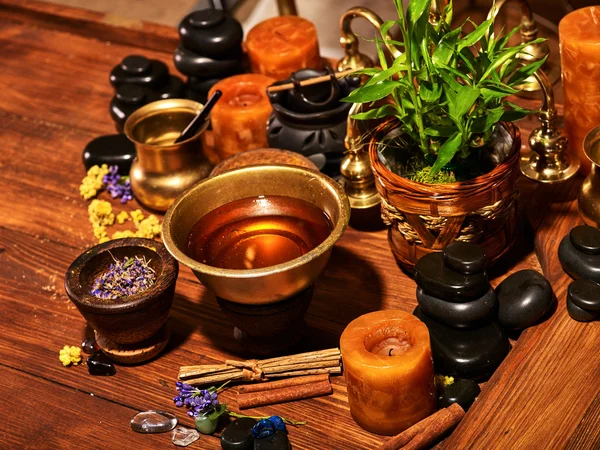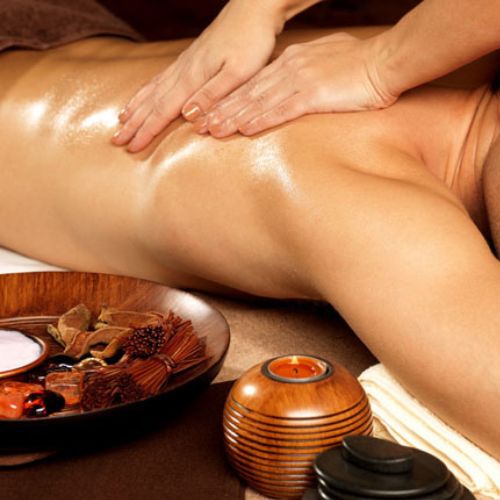- info@pureherbalayurvedic.com


Abhyangam, an ancient Ayurvedic healing practice, involves the application of specially prepared oils through massage, serving as a cornerstone of daily wellness routines and disease treatments. Utilizing Ayurvedic oils infused with medicinal herbs, this therapeutic massage commences from the head and extends down to the toes, encompassing even the ears and soles of the feet.
As a self-care ritual, Abhyangam can be performed independently, with daily sessions recommended for optimal benefits. By gently warming the oil before application, this rejuvenating practice offers unparalleled healing and revitalization for the body.
Stress Relief:
Pure Herbal addresses the root cause of stress, offering education and guidance to promote relaxation.
Regular Abhyangam massages aid significantly in stress alleviation and mental equilibrium adjustment.
Maintaining a Healthy Blood Pressure:
Ayurvedic practices, including Yoga and Abhyangam massages, effectively manage hypertension.
By adopting a holistic approach, individuals can alleviate stress-related hypertension and maintain kidney and cardiovascular health.
Improves Skin Health:
Abhyangam detoxifies the body, promotes circulation, and enhances skin health from within.
Warm oils penetrate the skin, hydrating tissues, reducing skin discoloration, cellulite, scars, and wrinkles, resulting in soft, smooth skin.
Reduce Muscle Ache and Stiffness:
Abhyangam soothes accumulated ‘Vata’ and removes ama, relieving muscular pain and tenderness.
Enhanced mobility and flexibility of joints and muscles are experienced with regular practice.
Promotes Lymphatic Drainage:
Abhyangam massage, performed with warm herbal oils, improves lymphatic drainage and reduces swelling.
Enhances detoxification, supporting the body’s immune system and overall health.
Other Benefits:
Improves vision, enhances physical strength, boosts energy levels, and delays aging onset.
Selection of Oils: The session begins with the selection of appropriate oils based on the individual’s body type (dosha) and specific health needs. These oils may include sesame oil, coconut oil, or herbal-infused oils prepared according to traditional Ayurvedic formulations.
Preparation of the Recipient: The recipient is comfortably positioned on a massage table or mat, ensuring relaxation and ease throughout the session. The room is often dimly lit with soft music playing to enhance the soothing ambiance.
Heating of Oils: The selected oils are gently heated to a comfortable temperature, ensuring that they remain warm throughout the massage. Heating the oils helps to enhance their therapeutic properties and facilitates absorption into the skin.
Application of Oil: The therapist begins by applying the warm oil generously to the entire body, starting from the scalp and working down to the tips of the toes. The oil is applied in long, flowing strokes, following the direction of the body’s energy channels (marma points).
Massage Technique: Using a combination of gentle strokes, circular motions, and kneading techniques, the therapist systematically massages each part of the body. Special attention is given to areas of tension, stiffness, or discomfort to promote relaxation and release muscular tension.
Duration of Massage: The duration of an Abhyangam session typically ranges from 45 minutes to 1 hour, depending on the individual’s needs and preferences. The therapist adjusts the pressure and intensity of the massage according to the recipient’s comfort level.
Integration of Marma Points: Throughout the massage, the therapist may stimulate specific marma points—vital energy centers believed to influence overall health and well-being. Gentle pressure applied to these points helps to balance the body’s energy and promote healing.
Rest and Integration: After the massage, the recipient is encouraged to rest for a short period, allowing the body to absorb the therapeutic benefits of the oils fully. It’s recommended to avoid bathing or showering immediately after the massage to allow the oils to penetrate deeply into the skin.
Post-Treatment Recommendations: The therapist may provide post-treatment recommendations, such as staying hydrated, practicing self-care rituals, and adopting a balanced lifestyle to prolong the effects of the massage.
Do you have questions or require assistance? Our team is here to support you. Feel free to reach out to us for any inquiries or concerns you may have.
Phone : +971 55 839 2820
info@pureherbalayurvedic.com
Office no M-05, Mohammad Ibrahim Obaidulla Bldg. Al Muraqqabat, Diera, Dubai.